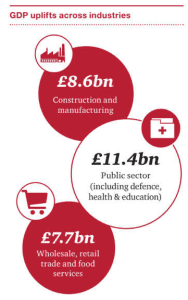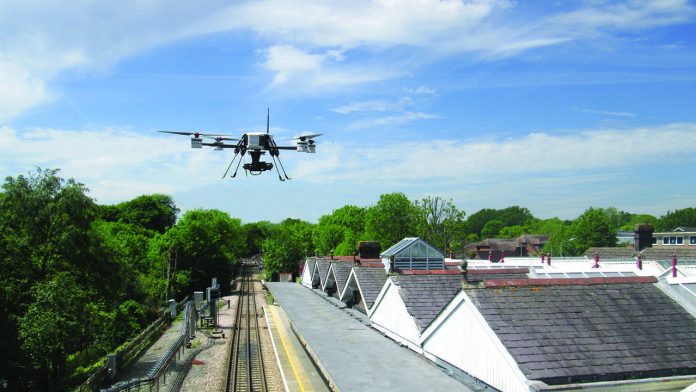Drones could increase UK GDP by £42 billion, or two per cent, by 2030, according to a new report by financial services firm PwC, with the largest productivity gains in the wholesale and retail trade sector in percentage terms (2.5 per cent) and the public sector in value terms (£11.4 billion).
The new research estimates there will be more than 76,000 drones, or unmanned aerial vehicles (UAVs), in use across UK skies by 2030, and 628,000 people working in the drone economy. More than a third (36%) could be utilised by the public sector, it said, mostly performing routine tasks, including deliveries and infrastructure inspections, more efficiently.
Transport for London (TfL) handed out its first drones licence last month, to UK civil engineering firm Lanes Rail, to carry out maintenance work on the London Underground network. Lanes Rail is responsible for maintaining and repairing a wide range of assets across the London Underground network for TfL, including track drainage, station buildings, bridges, power sites, and engineering works.
The PwC report finds drone technology could help the UK achieve up to £16 billion in net cost savings by 2030 through increased productivity. The technology, media and telecoms sector stands to save the most, with a potential net saving of £4.8 billion in the period. Sectors including financial services, transport and logistics, and government services also have great potential for savings, it said.
These savings will help the UK address issues with productivity. Cost reductions from UAV usage will feed into an increase of 3.2 per cent in “multi-factor” productivity across the UK economy, and contribute to large GDP uplifts in many industries, including £8.6 billion in construction and manufacturing, £7.7 billion in wholesale, retail trade and food services, and £11.4 billion in the public sector, including defence, health and education.
 The report said the combination of drones and automation may lead to workplace redundancies, but that, over time, the gains in cost savings, productivity and consumer demand generated by drones will create new jobs. New types of jobs to develop, build, operate and regulate drones will be needed, as changes in productivity and consumer demand resulting from drone usage create jobs.
The report said the combination of drones and automation may lead to workplace redundancies, but that, over time, the gains in cost savings, productivity and consumer demand generated by drones will create new jobs. New types of jobs to develop, build, operate and regulate drones will be needed, as changes in productivity and consumer demand resulting from drone usage create jobs.
But PwC warned its projections hinge on clearer UAV regulation and continued product development.
Elaine Whyte, UK drones leader at PwC, said: “The advantages of drone technology will be well established within the decade – not only for business purposes, but also for helping to protect society, for example, through being used by the emergency services. There is a need for current UK drone regulation to advance to see the estimations in our report become a reality, but it’s positive to see the Government already taking proactive steps to address this with the draft Drones Bill.
“In order to realise the full potential from drones, the immediate focus must be on developing society’s confidence in the technology to help drive acceptance and increase adoption. While drones are often currently viewed as more of a toy, by combining this emerging technology with the right business understanding and human insight there is a huge opportunity to help solve some of business and society’s most important problems.”
The UK government’s incoming Drones Bill, a plank in its broader Industrial Strategy, will ease the way, said Aviation Minister Baroness Sugg. “[Drones] are already improving people’s lives – helping the emergency services and keeping key national infrastructure like rail lines and power stations safe. Excitingly this is just the beginning, which is why Government is doing everything possible to harness the huge future potential through our Industrial Strategy and Drones Bill,” she said.
Jonathan Gillham, economics director at PwC, added: “Drones could spark significant improvements in the UK economy. The rise in GDP and job creation from drones uptake are expected to be substantial, but productivity is likely to see the greatest gains. By automating routine tasks, improving effectiveness, safety and reducing costs, drones will free up people to focus on higher-value work.”
UAVs are an increasingly familiar fixture in industrial maintenance. The European Commission has stumped up €4.72 million via its Horizon 2020 research and innovation programme to develop robot-drones to navigate hard-to-reach oil or gas refineries. It reckons UAVs could save these energy plants up to €700,000 annually in inspection costs.
US operator AT&T has outlined plans for UAV usage to survey and inspect cell towers, also investing in software to help repair tower equipment and carry radios to places where network traffic is heavy. Meanwhile, Finnish vendor Nokia has opened Europe’s first dedicated testing facility for the use of UAVs for traffic management, at Twente Airport in the Netherlands.

